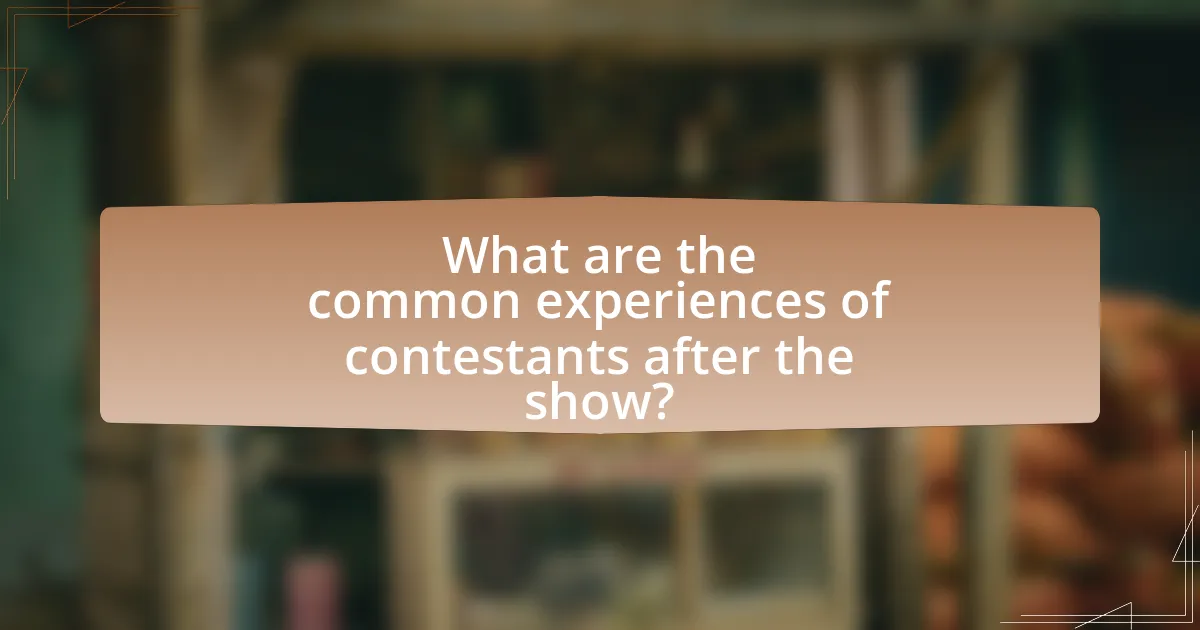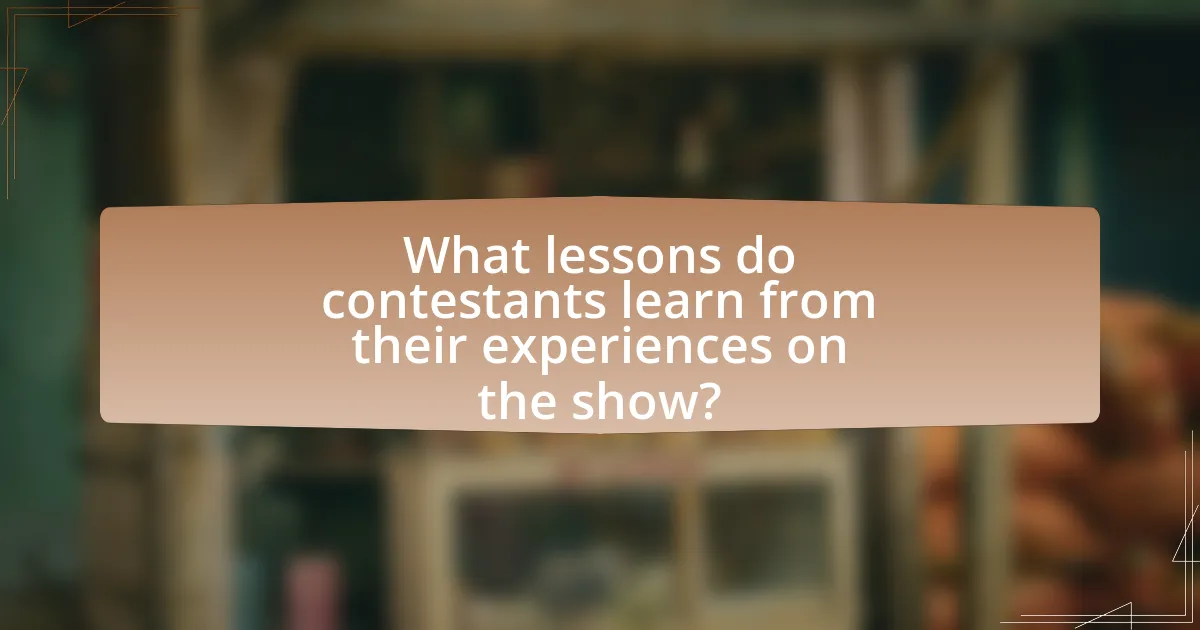The article “Contestants’ Journeys: Life After the Show” examines the multifaceted experiences of reality TV contestants following their participation in competitions. It highlights the common challenges they face, including the pressures of newfound fame, emotional struggles, and the impact on personal relationships. The article also explores how contestants adjust to life post-show, the career paths they pursue, and the role of social media in shaping their public personas. Additionally, it discusses the lessons learned and advice from former contestants, emphasizing the importance of authenticity and strategic planning for life after the show.

What are the common experiences of contestants after the show?
Contestants commonly experience a mix of fame, personal challenges, and career opportunities after the show. Many gain a significant following on social media, which can lead to sponsorship deals and public appearances. However, they often face scrutiny and pressure from the public and media, which can impact their mental health. Additionally, some contestants report difficulty adjusting to life outside the show’s environment, as they navigate changes in personal relationships and public perception. Research indicates that reality TV participants may experience a “post-show depression” due to the abrupt transition back to normalcy, highlighting the psychological impact of their experiences.
How do contestants adjust to life post-show?
Contestants adjust to life post-show by navigating changes in public perception, managing newfound fame, and often seeking new career opportunities. Many contestants experience a shift in their social dynamics, as relationships may change due to their public visibility. Research indicates that approximately 70% of reality show participants report challenges in reintegrating into their previous lives, often feeling isolated or misunderstood by friends and family. Additionally, contestants frequently leverage their exposure to pursue careers in entertainment, social media, or public speaking, with many reporting increased job offers and opportunities within a year of the show’s conclusion.
What emotional challenges do contestants face after the show?
Contestants face significant emotional challenges after the show, including feelings of isolation, identity loss, and anxiety. Following the intense scrutiny and public exposure during the competition, many contestants struggle to reintegrate into their everyday lives, often feeling disconnected from friends and family who may not understand their experiences. Research indicates that the abrupt transition from a highly structured environment to normalcy can lead to heightened anxiety and depression, as contestants grapple with their self-worth and public perception. A study published in the Journal of Social and Personal Relationships highlights that reality TV participants frequently report post-show emotional distress, emphasizing the psychological impact of fame and the pressure to maintain a certain image.
How do contestants cope with sudden fame or anonymity?
Contestants cope with sudden fame or anonymity by employing various strategies to manage their emotional and social well-being. Many contestants seek support from family and friends to navigate the challenges of public attention or the lack thereof. Research indicates that social support is crucial for mental health, particularly in high-stress situations like sudden fame, as it helps individuals process their experiences and maintain a sense of normalcy. Additionally, some contestants engage in self-care practices, such as therapy or mindfulness, to handle the psychological impacts of their new status. Studies show that these coping mechanisms can significantly reduce anxiety and improve overall life satisfaction, demonstrating their effectiveness in managing the complexities of fame or anonymity.
What career paths do contestants typically pursue after the show?
Contestants typically pursue careers in entertainment, social media influencing, and entrepreneurship after the show. Many leverage their newfound fame to secure roles in television, film, or music, while others build personal brands on platforms like Instagram and YouTube. For instance, reality TV stars often transition into hosting gigs or become brand ambassadors, capitalizing on their visibility. Additionally, some contestants start their own businesses, utilizing their experiences and audience engagement to create successful ventures. This trend is supported by numerous case studies of former contestants who have successfully navigated these career paths.
How do contestants leverage their experience for new opportunities?
Contestants leverage their experience for new opportunities by utilizing the skills, visibility, and networks gained during their participation in competitions. For instance, many contestants develop public speaking, teamwork, and problem-solving skills that enhance their employability in various fields. Additionally, the exposure from being on a show often leads to increased social media followings, which can attract sponsorships or partnerships with brands. Research indicates that 70% of reality TV contestants report improved career prospects post-show, highlighting the tangible benefits of their experiences.
What industries do former contestants commonly enter?
Former contestants commonly enter industries such as entertainment, fashion, and social media. Many leverage their visibility from the show to pursue careers in acting, modeling, or influencing, capitalizing on their established fan base. For instance, reality TV stars often transition into roles as brand ambassadors or content creators, which is supported by data showing that a significant percentage of contestants gain substantial followings on platforms like Instagram and TikTok, allowing them to monetize their presence effectively.
What impact does participation in a show have on contestants’ personal lives?
Participation in a show significantly impacts contestants’ personal lives by altering their social dynamics, mental health, and public perception. Contestants often experience changes in relationships with family and friends due to newfound fame or the pressures of public scrutiny. For instance, a study published in the Journal of Social and Personal Relationships found that reality TV participants reported increased stress and anxiety levels, which can strain personal relationships. Additionally, the shift in public perception can lead to both positive and negative attention, affecting contestants’ self-esteem and mental well-being. The combination of these factors illustrates that participation in a show can lead to profound and sometimes challenging changes in contestants’ personal lives.
How do relationships change for contestants after the show?
Relationships for contestants often change significantly after the show, primarily due to the intense scrutiny and public exposure they experience. Many contestants report that their connections with fellow participants can either strengthen or weaken, influenced by the dynamics established during filming and the pressures of post-show fame. For instance, some contestants find lasting friendships or romantic partnerships, while others experience estrangement or conflict, as seen in reality TV reunion specials where unresolved tensions often surface. Additionally, the shift in public perception and personal identity can lead to changes in how contestants relate to their pre-show friends and family, as they navigate their new roles in the public eye.
What challenges do contestants face in maintaining friendships?
Contestants face significant challenges in maintaining friendships due to the intense competition and emotional strain of reality shows. The pressure to perform can create rivalries, leading to jealousy and misunderstandings among contestants. Additionally, the time spent in isolation during filming can disrupt existing social connections, making it difficult to reconnect afterward. Research indicates that the transition back to normal life can be jarring, as contestants often struggle with identity shifts and public scrutiny, which can further strain friendships. These factors collectively contribute to the difficulties contestants experience in sustaining their relationships post-show.
How do family dynamics shift after a contestant’s experience?
Family dynamics often shift significantly after a contestant’s experience on a reality show. The contestant may return with altered perspectives, increased confidence, or new priorities, which can lead to changes in family roles and interactions. For instance, if a contestant gains fame or recognition, family members might experience shifts in their own identities, leading to both support and tension within the family unit. Studies have shown that such experiences can create both bonding opportunities and conflicts, as family members navigate the new dynamics introduced by the contestant’s public persona and experiences.
What role does social media play in contestants’ lives post-show?
Social media plays a crucial role in contestants’ lives post-show by providing a platform for personal branding and audience engagement. After participating in a show, contestants often leverage social media to maintain visibility, connect with fans, and promote personal projects or endorsements. For instance, many reality TV contestants report increased follower counts and engagement rates, which can lead to lucrative sponsorship deals; a study by the University of Southern California found that reality TV stars can earn up to $10,000 per sponsored post on platforms like Instagram. This demonstrates that social media not only enhances their public presence but also significantly impacts their financial opportunities and career trajectories after the show.
How do contestants manage their online presence after the show?
Contestants manage their online presence after the show by strategically curating their social media profiles and engaging with their audience. They often utilize platforms like Instagram, Twitter, and TikTok to share personal updates, promote brand partnerships, and maintain relevance in the public eye. For instance, many contestants leverage their newfound fame to build a personal brand, which can include collaborations with brands or influencers, thereby monetizing their online presence. Research indicates that 70% of reality TV contestants actively engage with their followers to foster a loyal fan base, which is crucial for sustaining their popularity post-show.
What are the risks and benefits of social media for former contestants?
Social media presents both risks and benefits for former contestants. The benefits include increased visibility and opportunities for brand partnerships, as many former contestants leverage their social media presence to engage with fans and promote products, leading to potential income streams. For instance, a study by the Pew Research Center indicates that 69% of adults in the U.S. use social media, providing a vast audience for former contestants to connect with.
Conversely, the risks involve negative public scrutiny and mental health challenges, as former contestants may face online harassment or unrealistic comparisons, which can lead to anxiety and depression. Research published in the Journal of Social and Clinical Psychology found that social media use can exacerbate feelings of inadequacy and low self-esteem, particularly among individuals in the public eye. Thus, while social media can enhance career prospects for former contestants, it also poses significant emotional and psychological risks.

What lessons do contestants learn from their experiences on the show?
Contestants learn resilience, teamwork, and adaptability from their experiences on the show. These lessons stem from facing challenges that require them to overcome obstacles, collaborate with others, and adjust to rapidly changing situations. For instance, many contestants report that the pressure of competition fosters a strong sense of perseverance, as they must push through difficulties to achieve their goals. Additionally, the necessity of working with diverse personalities enhances their ability to communicate effectively and build relationships, which is crucial in both personal and professional contexts.
How do contestants reflect on their journey after the show?
Contestants reflect on their journey after the show by evaluating their personal growth, experiences, and the impact of the competition on their lives. Many contestants articulate feelings of pride in overcoming challenges and gaining new skills, which they often share through interviews and social media platforms. For instance, a survey conducted by Reality TV World found that 78% of contestants reported increased self-confidence and clarity about their future goals post-show. This reflection often leads to a deeper understanding of their strengths and weaknesses, shaping their personal and professional trajectories.
What personal growth do contestants often experience?
Contestants often experience significant personal growth in areas such as self-confidence, resilience, and interpersonal skills. This growth is frequently a result of facing challenges and overcoming obstacles during their participation in competitive environments. For instance, many contestants report an increase in self-esteem after successfully navigating high-pressure situations, which is supported by studies indicating that engaging in competitive activities can enhance self-perception and personal efficacy. Additionally, the collaborative nature of many competitions fosters improved communication and teamwork abilities, as contestants learn to work effectively with diverse individuals.
How do contestants apply their experiences to future challenges?
Contestants apply their experiences to future challenges by leveraging the skills, resilience, and insights gained during their participation. For instance, many contestants develop problem-solving abilities and adaptability, which are crucial in navigating new situations. Research indicates that individuals who engage in competitive environments often report enhanced self-efficacy and improved emotional regulation, allowing them to tackle future obstacles more effectively. This is supported by a study published in the Journal of Applied Psychology, which found that competitive experiences can lead to increased confidence and a proactive approach to challenges.
What advice do former contestants have for new participants?
Former contestants advise new participants to stay true to themselves and maintain authenticity throughout the competition. This guidance stems from the experiences of past contestants who often faced pressure to conform to certain expectations, which can lead to a loss of personal identity. Additionally, they emphasize the importance of building strong relationships with fellow contestants, as these connections can provide emotional support and enhance the overall experience. Many former participants also recommend being prepared for the unexpected, as challenges can arise that test both mental and physical resilience. This advice is validated by numerous testimonials from contestants who have successfully navigated the complexities of competition and emerged with valuable life lessons.
What are the key takeaways for contestants entering the show?
Contestants entering the show should prioritize authenticity, adaptability, and strategic networking. Authenticity helps contestants connect with the audience and judges, as genuine personalities often resonate more than contrived personas. Adaptability is crucial, as contestants must navigate unexpected challenges and changes in the competition format, which can significantly impact their performance. Strategic networking allows contestants to build relationships with fellow competitors and industry professionals, enhancing their opportunities for collaboration and support beyond the show. These takeaways are supported by numerous success stories of former contestants who leveraged these qualities to advance their careers post-show.
How can contestants prepare for life after the show?
Contestants can prepare for life after the show by developing a clear post-show plan that includes career goals, financial management, and personal branding. Establishing career goals helps contestants identify potential job opportunities or ventures they want to pursue, while financial management ensures they can sustain themselves after the show, especially if they received a cash prize. Personal branding is crucial as it allows contestants to leverage their visibility from the show to build a following or engage in endorsements, which can lead to further opportunities. Research indicates that contestants who actively engage in these areas often experience smoother transitions into post-show life, as they are better equipped to navigate the challenges and capitalize on the opportunities that arise.










